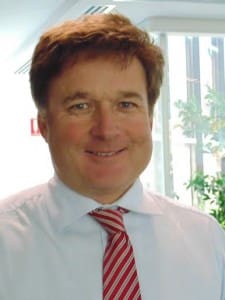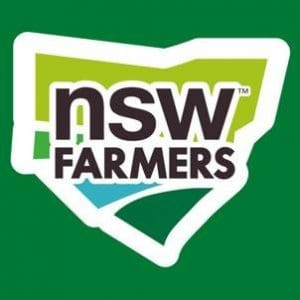
NSW Farmers’ Wool Committee chair Ed Storey
PEAK wool grower body WoolProducers Australia has claimed it has not disenfranchised its grower members by negotiating with Australian Wool Innovation to avoid a contentious extraordinary meeting over governance issues.
WoolProducers Australia said it is pleased that the wool industry will avoid “a contentious EGM” on issues affecting the operations of AWI.
WPA president Ed Storey said WoolProducers will inform growers of the detail in a consensus agreement with AWI “in due course”.
Mr Storey said the consensus agreement included that the new AWI BNC would include a chair appointed by the Department of Agriculture and Water Resources, two AWI directors, a senior executive of an international executive search firm, nominated by the AWI and subject to approval by the independent chair, and an independent member appointed by the ICC rather than the National Farmers Federation, although Mr Storey did not know what the new ICC’s makeup would be.
“That BNC model will be in place in time for the 2019 director elections.”
Other changes agreed to were that the 100 shareholder signature requirement for board candidates not needing BNC approval would be retained for the 2019 annual general meeting. Individual shareholders without the signatures would have to go through the BNC process, but this would require constitutional change and go as a resolution to the 2019 AGM with board support, Mr Storey said.
“I don’t know why that wasn’t mentioned in the AWI release.”
Mr Storey agreed the single shareholder pathway with BNC approval would give the current AWI board clique the ability to fast-track a preferred candidate onto the board.
“But if it had gone to an EGM, and this is the whole reason we did these negotiations, we very firmly believe it would have been extremely difficult to get 75pc to change the constitution and we therefore we risked getting nothing.”
Mr Storey said AWI has undertaken that the AWI chair will declare in the notice of meeting how he or she will direct open proxies.
“It will be fully transparent – it will be in the board charter or the constitution, it will happen.”
Mr Storey said a clearer definition of AWI director independence would be written in the AWI’s board charter or constitution.
“A director who holds more than five percent of the levy votes will be deemed to be non-independent.
“So an ordinary wool grower because they grow wool will not be deemed to be non-independent.”
Mr Storey said AWI has undertaken it will revamp its “whole assessment of director independence.”
“From a director’s tenth year onwards, they will have to go through a formal assessment process to determine if they are independent or not and that will be published well in advance of any election on annual basis.”
No agreement on board director tenure with AWI
Mr Storey said WPA could not agree on changes to AWI’s board tenure limits.
“We offered a number of ideas that we thought might have presented a solution, but in the end we couldn’t reach agreement.
“Their final offer wasn’t consistent with the intent of the recommendations,” he said.
“So we’ve agreed to keep talking and we are going to come up with a solution to that.”
Mr Storey said WPA did not give AWI “all they wanted,” though he could not list what concessions he gained from AWI apart from avoiding an EGM.
“Our board was across the issues as they arose, what we have avoided is having an EGM,” he said.
“We’ve implemented the intent of the recommendations and have avoided a contentious EGM that it would have been extremely difficult if not impossible to get 75pc support.
“The risk was that we get nothing.”
He believes AWI would have taken the recommendations as resolutions to an EGM if the grower bodies had not negotiated.
“They might have endorsed some motions and not others, I don’t know – you would have to ask the department and AWI about that.
“Our values were implementing the intent of the recommendations – to make the BNC more independent, to get more transparency around the chairman and the use of proxies and to have a pathway for board candidates that might find it difficult to get 100 signatures,” he said.
“We haven’t disenfranchised people, there were a number of reasons why we didn’t think an EGM wouldn’t have led to a successful resolution on these matters.
“The risk was that we wouldn’t get the intent of the recommendations implemented.”
Mr Storey believed the consensus agreement is the start of a process at AWI that will lead to “much better” governance and more transparency.
“We think with new leadership AWI has changed direction and will move toward being more transparent, given that they receive a compulsory levy and that their governance practices are improving.”
WoolProducers had advocated for the implementation of all 82 recommendations to improve the transparency and governance of AWI, but in late 2018, initiated discussions with AWI to avoid a hostile EGM whereby 75pc of votes returned needed to be in favour of a resolution to change the constitution.
“To gain 75pc of shareholder support was a big ask, particularly when there was no initial agreement by sectors of the industry on these contentious issues,” Mr Storey said.
“The recent WoolPoll vote gained 52.82pc support for 1.5pc on the third round of preferences, which is a long way short of the required 75% for constitutional change, which is why WoolProducers strongly believes that to negotiate this outcome was in the best interests of all wool growers,” he said.
“Without this negotiated outcome, there was no guarantee that the required changes would have been made.
“There is still work to do on tenure and WoolProducers will continue to show leadership and enter into these discussions with AWI in good faith in the best interests of industry,” Mr Storey said.
Despite Minister for Agriculture David Littleproud failing to ensure AWI implement the 82 recommendations of the EY review as written, Mr Storey said the minister has been “very strong” in pointing out that AWI needed to implement them.
WPA said it looked forward to continuing to work with the new leadership of AWI and hoped that the recent discussion demonstrated the start of a constructive relationship with AWI. The peak body also acknowledged Mr Littleproud’s leadership in wool industry issues.
NSW Farmers supports WPA stance on agreement
 NSW Farmers Wool Committee chairman Andrew Wood said he welcomed AWI engaging in meaningful consultation with WoolProducers Australia.
NSW Farmers Wool Committee chairman Andrew Wood said he welcomed AWI engaging in meaningful consultation with WoolProducers Australia.
“It’s a great outcome for industry that the WPA and AWI negotiations secured a result.
“Wool growers are the big winner with this announcement,” Mr Wood said.
“Today, a line was drawn in the sand. AWI has now accepted the recommendations.
“The wool industry can now move past the review and get on with what we do best, growing the world’s best wool,” he said.
“Hopefully it indicates that in the future AWI intends to interact with industry in good faith.”
Mr Woods said in avoiding EGM, AWI has saved a significant expense.
But despite the progress made so far, Mr Woods said NSW Farmers will continue to push for AWI to accept the last outstanding recommendation which would cap board tenure at 10 years.
“I hope that AWI see the benefit in limiting board tenure, it will benefit all of industry by promoting continuity of new ideas and thinking”.

This may or may not be a good outcome; we have to take WoolProducers Australia’s word for it.
But the concerning issue stems from a question of how representative WPA and other self-appointed wool groups are, given in the case of WPA, it is a derivative of the National Farmers Federation, and its membership is obscure.
What input have wool growers had lately on board or committee notices, transparency of proceedings, etc., annual reports, etc.? There once was an orderly process in this regard, but it seems to have escaped notice.
The point is that AWI has its stakeholders. It is these people who should take constitutional decisions about that organisation, not delegated to third parties.
If the proposed amendments are serious and if the review determined that they be implemented, the first duty is to call the requisite EGM and if the vote does not meet the threshold for validity, it is open to the government to seek the necessary changes by statute. In that way, the propriety and integrity of process will have been maintained as distinct from these dodgy manoeuvres.
To rely on AWI’s word and goodwill in these matters suggests that those concerned haven’t been around for long.